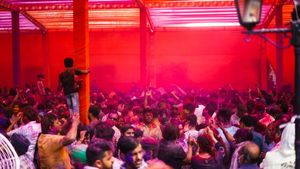Katra, Jammu and Kashmir – The tranquil pathways to the revered Mata Vaishno Devi shrine have turned tumultuous, as local stakeholders continue to voice strong opposition against the planned ₹250 crore ropeway project intended to link Tarakote Marg to Sanji Chhat. Thousands of pilgrims are facing significant hardships as the protests sweep through the region, entangling thousands of lives along the 12-kilometer trek to the shrine situated at the top of the Trikuta hills.
Beginning on November 21, 2024, the agitation escalated to new heights when local shopkeepers, pony operators, and palanquin bearers declared a 72-hour strike. The announcement sparked immediate strife among the community, which considers the proposed ropeway project as a direct threat to their livelihoods and the serene experience of pilgrimage.
While the businesses located at the base camp of Katra remained operational, shops lining the pilgrimage route from Ban Ganga to Charan Paduka observed extensive closures, displaying unity against the Shrine Board's plans. With the suspension of pony and palanquin services, vulnerable pilgrims, especially the elderly and differently-abled, are finding it almost impossible to continue their sacred journeys.
Gatherings at Shalimar Park have become the focal points for protestors, where peaceful sit-ins, filled with passionate slogans denouncing the ropeway project, fill the air with calls for local rights and economic security. Notably, senior Congressman Bhupinder Singh Jamwal, addressing crowds, highlighted the urgent need for the government to come up with comprehensive rehabilitation strategies for those impacted, stating: “We stand united against this ropeway project, and the government must provide adequate support to safeguard our livelihoods.”
Leaders of the Shopkeepers’ Association have accused authorities of not honoring past promises to engage with local concerns over the project. One representative expressed anger over perceived government betrayals, exclaiming, “We have voiced our concerns for years, but now the government moves forward as if we don't exist.” He asserted threats of intensified strikes if their demands remain unheeded.
Conversely, the Shrine Board defends the project adamantly. Executives argue it will create safer, more expedient travel for pilgrims, particularly during peak visitation times. Board CEO Anshul Garg remarked, “The ropeway will revolutionize the pilgrimage experience, making it far more accessible and secure, and we anticipate its completion within the next two years.”
Despite these optimistic projections, protestors maintain the project risks devastating the local economy, arguing the livelihoods of thousands, including shopkeepers and transport workers, are at stake. For them, the annual pilgrimage season is not just about faith; it's about survival and sustenance. The connections formed here over generations cannot be erased overnight.
The activists extended their strike on Sunday, insisting on immediate acknowledgment and action from the authorities to protect local jobs. Manish Sahni, Chief of the local J-K unit of Shiv Sena (UBT), echoed protestors' sentiments, linking the project to potential disrespect of religious sentiments among Hindu devotees.
Jamwal's proposals for financial support, directing aid of ₹20 lakh for each affected individual, have captured attention, as he calls for government intervention. By the end of the prolonged protests, the community collectively expressed hope for constructive dialogue, urging government representatives to find solutions instead of letting matters spiral out of control.
Local residents brace themselves for what may lie ahead, feeling the weight of the situation as discussions loom about possibly reinstigated support for the ropeway or newly introduced plans for preserving their livelihoods. Children, mothers, and fathers raised under the shadow of the Trikuta hills take pride in their heritage, their strength rooted not just within economic exchanges, but the very fabric of their culture surrounding worship and devotion.
The momentum seems set for decisive negotiations as the unrest continues, with the Shrine Board's assertion of development colliding against the backdrop of material suffering among local families. Tensions weave through anticipation as pilgrims wish for sooner resolutions, rather than prolonged uncertainty on their sacred paths.
While the strike has technically concluded, breaking clear paths for pilgrims once more, the anger of those feeling left out of the decision-making process echoes loudly through Katra. The local stakeholders have made it clear: they won't back down, and their voice will remain strong until their livelihoods are assured, and the sanctity of their beloved pilgrimage is preserved.



